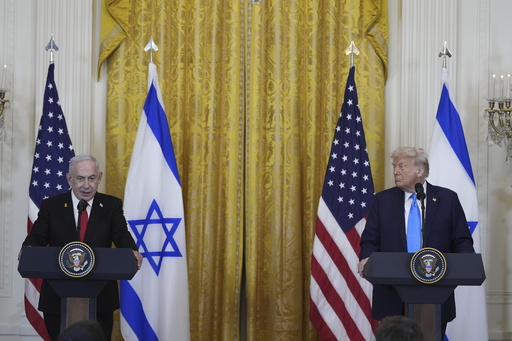On Tuesday, President Donald Trump expressed his desire for the United States to take responsibility for the Gaza Strip, suggesting a redevelopment initiative following the relocation of displaced Palestinians to other areas. During a joint press conference with Israeli Prime Minister Benjamin Netanyahu, Trump emphasized the U.S. role in cleaning up remnants of war, stating, “We will own it and be responsible for dismantling all of the dangerous unexploded bombs and other weapons on the site.” He elaborated on his vision to level destroyed buildings and create an economic environment that would provide numerous jobs and housing opportunities for the local population.
This declaration followed Trump’s previous assertion that the displaced Palestinians in Gaza should be “permanently” resettled outside the conflict-ridden region. He made these comments at the beginning of their meeting at the White House, where discussions included the fragile ceasefire and the hostage negotiation efforts amid the ongoing Israeli-Hamas conflict. “I don’t think people should be going back,” Trump remarked. “You can’t live in Gaza right now. I think we need another location, somewhere that’s going to make people happy.”
Trump’s call for mass relocation comes during a time of heightened uncertainty regarding the viability of the recent temporary ceasefire and hostage agreement negotiated between Israel and Hamas. Key allies in the Middle East, including Egypt and Jordan, have advised against such relocation, warning that it could further destabilize the region, exacerbate the conflict, and compromise long-standing efforts towards a two-state solution.
Despite these warnings, Trump maintained that Palestinians “have no alternative” but to vacate what he referred to as the “big pile of rubble” that Gaza has become. His comments coincided with his administration’s concerns that a timeline of three to five years for reconstruction, as discussed in a temporary truce agreement, is unrealistic. Last week, leaders from Egypt and Jordan publicly rejected Trump’s idea of resettling Gazans, though Trump remains hopeful that these countries may eventually agree to accept the refugees.
Trump pointed out that for decades, Gaza has been a site of persistent suffering, stating, “It’s all death in Gaza. If we can get a beautiful area to resettle people, permanently, in nice homes where they can be happy and not be shot at or killed, that would be monumental.” His administration is focused on the future of Gaza’s population as the temporary truce remains precarious.
Netanyahu is under pressure from hardline factions within his right-wing government to end the ceasefire against Hamas while also managing the demands of war-weary Israeli citizens who seek the return of hostages and an end to ongoing violence. A coalition of Arab nations, including Saudi Arabia and the United Arab Emirates, has also rejected Trump’s plan, voicing their disapproval of relocating Palestinians from Gaza and the occupied West Bank.
Trump’s administration is hopeful that they can leverage significant U.S. aid to persuade Egypt and Jordan to accept the displaced Palestinians. Additionally, right-wing supporters of Netanyahu’s government have shown enthusiasm for Trump’s resettlement proposal. “To me, it is unfair to explain to Palestinians that they might be back in five years,” commented Trump’s Middle East envoy, Steve Witkoff.
Trump also indicated that he might reconsider the establishment of an independent Palestinian state as part of a more comprehensive two-state solution, acknowledging that conditions have evolved since his last proposal in 2020. He reflected, “A lot of death has occurred since I left and now came back… we’re faced with a very complex and difficult situation that we’ll solve.”
The gathering also coincided with Netanyahu’s ongoing corruption trial, where he has faced allegations of misconduct involving favors exchanged with influential figures. His association with Trump, who enjoys significant popularity in Israel, is seen as a potential strategy to bolster public support during his legal battles.
As Netanyahu prepares for this first visit abroad since arrest warrants were issued against him in connection with alleged war crimes, he is looking to solidify the ceasefire discussions. Following this meeting, he intends to dispatch a delegation to Qatar to continue negotiations with Hamas, confirmed as crucial intermediaries in the ongoing conflict. Meanwhile, the Israeli leader has expressed his commitment to a comprehensive victory over Hamas and the safe return of all hostages taken during the October 7, 2023 attack.
Among those affected by the ongoing conflict, some families of hostages, such as Einav Zangauker, are calling upon Trump to utilize his influence to ensure Netanyahu adheres to the agreements made for resolution. Zangauker highlighted the necessity of American intervention to resist the pressures imposed by extremist elements in Israel aimed at derailing peace efforts.
Additionally, during the visit, Netanyahu plans to advocate for more rigorous action against Iran, capitalizing on recent military achievements against militant forces in neighboring regions. In a preceding move, Trump signed an executive order designed to intensify economic sanctions against Iran, underscoring his administration’s stance against Tehran acquiring nuclear weapons.




